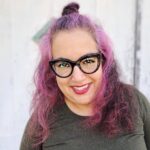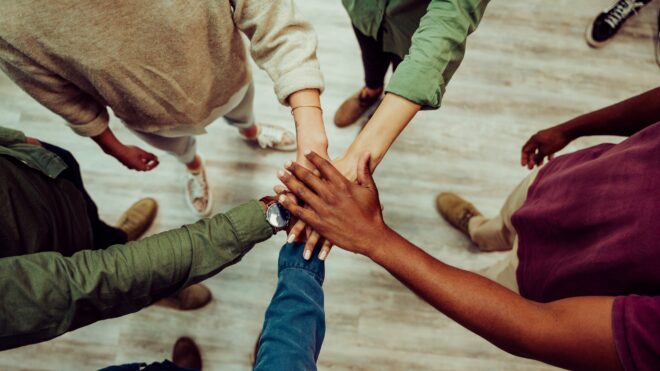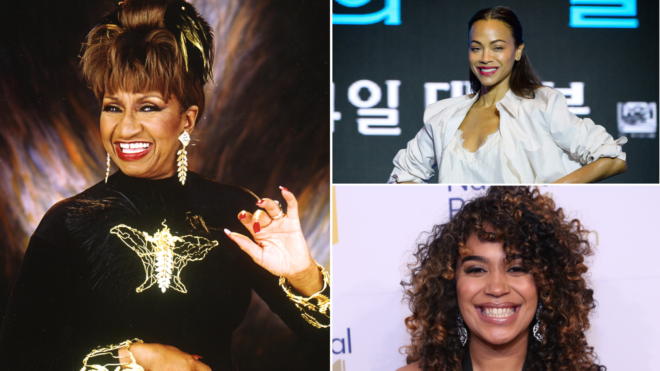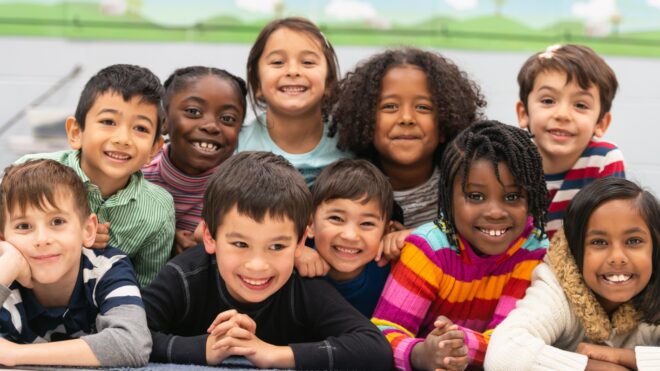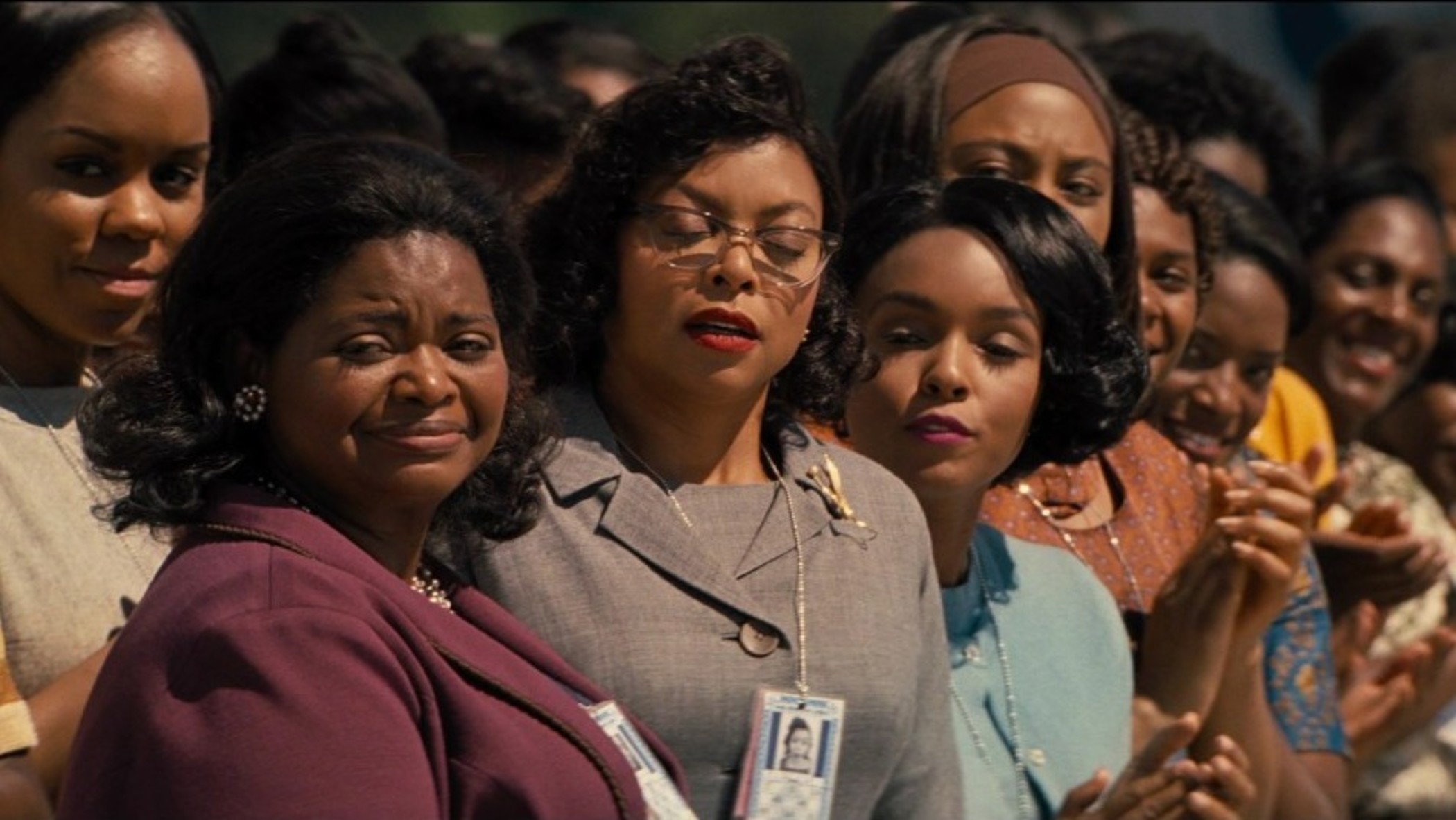
We wanted to share some movie options with you that you can use to start conversations and teach your kids about racial diversity. This topic has always been important, but right now it's a topic we should all be addressing, especially with our children, because they need to understand why protesting systemic racism is crucial. We have to remember that children are not born with a knowledge of history and that it is up to us to teach them how the past has led to the present. Movies that deal with antiracism, racial justice, and diversity are a great way to broach the subject, because many of us already have a standing family movie night set up. If not, there's no time like the present to start a weekly movie night tradition.
More from MamásLatinas: Afro-Latino children's books to read with your kids
Family movie nights are a great way to hang out as a family and bond. They can also help us introduce topics, stories, and issues that are important to us as parents to our children without them feeling like we are lecturing them. Because let's face it—sometimes when we go into teaching mode with our kids, whatever we say goes in one ear and out the other. We think we're being all wise and inspirational, and all they're hearing is "blah, blah, blah, blah, blah." The beauty of watching a movie together is that afterward you can all talk about it.
Here are a few movies we think you might want to add to your family movie night queue to prompt discussions about racial diversity, justice, and equity. We've included the Common Sense Media age recommendations, when available, to help you decide which films are age-appropriate for your children.
'Encanto' is best for children ages 6 and older.
Disney's Encanto was an instant hit, which is no surprise. The animation is great, the songs are catchy, and the celebration of Colombia are all reasons to love it. Another reason is how well the movie represents diversity within the greater Latino community and within a specific Latino community. Characters come in a range of skin tones and with hair that is straight, curly, and everything in between.
'Vivo' is best for children ages 6 and older.
Vivo is a celebration of Cuban culture. One reviewer on YouTube wrote: "As a Cuban, I am so happy about this movie, we have almost no representation, [especially] like this. Cheerful, wholesome, I even cried a bit."
‘Akeelah and the Bee’ is best for ages 8 and older.
Akeelah is 11 years old and can spell so well that she ends up competing in the Scripps National Spelling Bee. Her journey to that spelling bee is not easy, though. She has to deal with racism from her competitors' parents and with the pressure of representing her community.
‘Zootopia’ is best for ages 8 and older.
This animated film tells the story of Judy Hopps, the first rabbit to join the police force of the metropolis Zootopia. In Zootopia, predators and prey live together in perfect harmony, but not for long. The message of the movie is intended to be that discrimination is wrong. The movie definitely has some shortcomings, but it can work as a conversation starter.
‘And the Children Shall Lead’ is best for ages 9 and older.
Set in Mississippi during the early '60s, the film follows the story of a 12-year-old black girl who has to take a stand on civil rights issues when civil rights workers come to town to register voters. The film shows how rules of racial segregation like bathrooms for "whites only" affected the people in this supposedly tight-knit community on a daily basis.
‘A Ballerina's Tale’ is best for ages 9 and older.
Misty Copeland narrates this documentary about her career as a ballerina. It follows her journey to becoming the first African American principal dancer at New York's American Ballet Theater on June 30, 2015. Despite many challenges and long-held biases in the ballet world, she managed to rise to the top.
‘The Color of Friendship’ is best for ages 9 and older.
This movie was made by the Disney Channel and is set in 1977, which gives it a bit of a dated look, but give it a chance. It tells the true story of two girls of very different backgrounds. Mahree is the daughter of a congressman in the United States, and Piper is from South Africa during apartheid.
‘Hidden Figures’ is best for ages 10 and older.
Set in the 1960s, the film is based on the true story of Katherine Johnson, Dorothy Vaughan, and Mary Jackson, three black female mathematicians. All three of them worked for the NASA space program in the early days and had to deal with both race and gender discrimination regardless of their brilliance.
‘Ruby Bridges’ is best for ages 10 and older.
Ruby Bridges was only 6 years old when she became one of the first black students to attend an integrated school in the Deep South. This movie is based on the true story of a little girl who had to contend with the ugly horrors of racism in 1960 and how she was able to cope.
'Belle' is best for ages 11 and older.
The movie was inspired by the true late 18th-century story of Dido Elizabeth Belle, the mixed-race daughter of Royal Navy Captain Sir John Lindsay and a woman he had an affair with while overseas. Belle ends up being raised by her great uncle, Lord William Murray, in England. Belle goes on to play an important role in abolishing slavery in England.
‘Pride’ is best for ages 12 and older.
This film is based on the true story of Jim Ellis, who took a job working at the Marcus Foster Recreation Center in Philadelphia, Pennsylvania. At the center, Jim fixes up the swimming pool and starts the city's first all-black swim team.
‘Loving‘ is best for ages 12 and older.
The movie is based on the real-life story of Richard and Mildred Loving, an interracial couple. After they got married, they had to spend nine years fighting for the right to live as a family. In their 1967 civil rights case, Loving v. Virginia, the Supreme Court struck down laws banning interracial marriage.
'The Boy Who Harnessed the Wind' is best for children ages 12 and older.
The Boy Who Harnessed the Wind is based on the true story of William Kamkwamba, who built a windmill by himself when he was only 13 years old in order to save his family and village after floods ruined their crops and land. This happened in Malawi in the early 2000s, and William went on to study at Dartmouth College.
'The Secret Life of Bees' is best for ages 13 and older.
It's 1964 and Lily, who is 14 years old, runs away from her dad. She goes with her black housekeeper to Tiburon and meets the Boatright sisters. The sisters teach Lily about beekeeping and white privilege. The movie has a great cast that includes Dakota Fanning, Queen Latifah, Jennifer Hudson, Alicia Keys, and Sophie Okonedo.
‘The Hate U Give’ is best for ages 13 and older.
It's a fictional story that feels very grounded in reality. Starr Carter is a 16-year-old who witnesses her childhood friend get killed by a police officer. Starr finds a way to speak up and use her voice to fight racial injustice.
‘Hard Lessons’ is a made-for-TV movie that is unrated.
Denzel Washington plays George McKenna in this biographical drama. It's based on the true-life story of George McKenna, who became the principal at an inner-city high school in South Los Angeles. He was determined to give all of his students, regardless of race or background, the opportunity to get a good education.
‘Queen of Katwe’ is rated PG.
This biographical drama is set in a slum of Katwe in Kampala, Uganda, and
tells the story of Phiona Mutesi, a 10-year-old girl who learns how to play chess from a missionary. Phiona ends up becoming an internationally recognized chess prodigy. Regardless of her gift, she still has to deal with racism, poverty, and violence.
